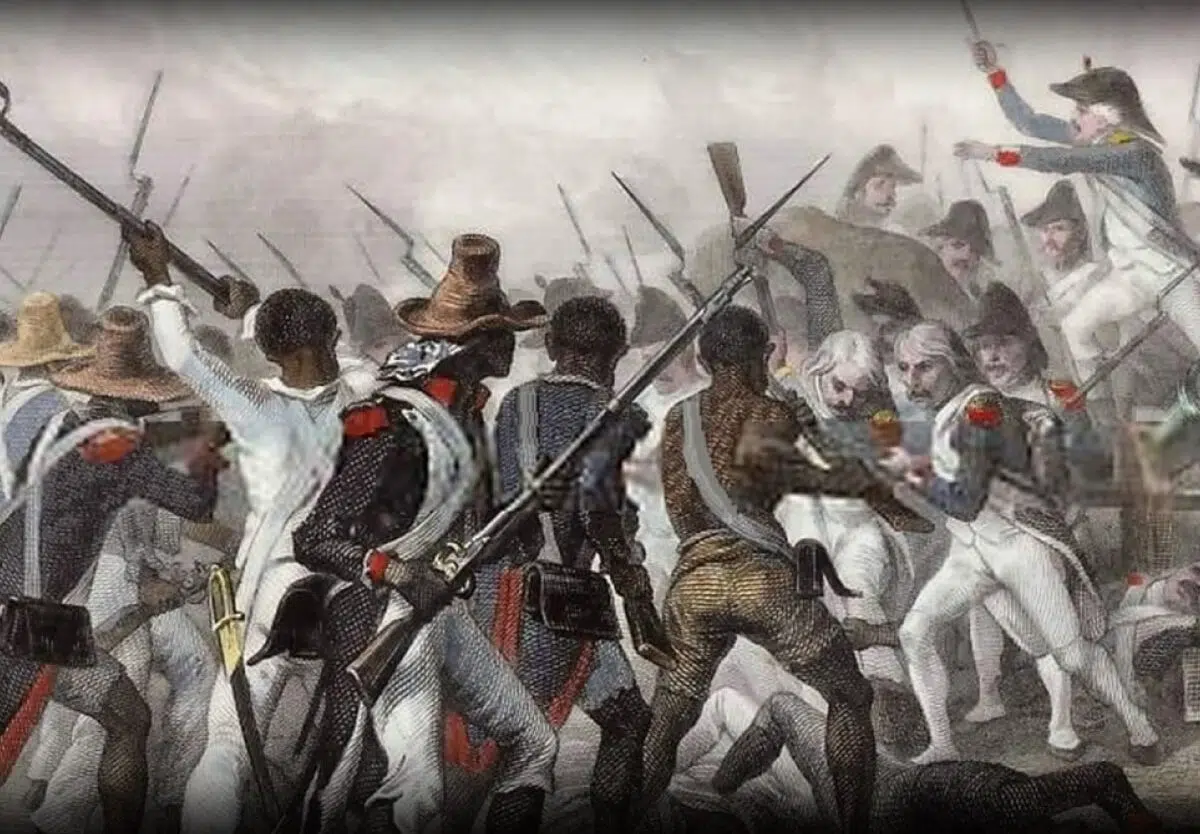The island of Haiti unites to observe Battle of Vertières Day, a significant event in their war for independence, every November 18. The Battle of Vertières, the final fight between the natives and the French army before Haiti gained freedom, is celebrated across the country. The victory led to Haiti becoming the first country to stage a successful slave revolution and the first postcolonial free state in Latin America. The day is marked by a president’s speech and multiple patriotic and private events.
History of Battle of Vertières Day
After the Spanish left the island of Hispaniola, which later became Haiti and the Dominican Republic, the French took over. They established colonies in 1625, constructing sugar and coffee plantations throughout the island and bringing thousands of enslaved people to work in these plantations. These workers would rebel against exploitation in the 18th century, launching what is known as the Haitian Revolution.
However, the French refused to leave the island, which had proven immensely profitable. Haiti, formerly named Saint-Domingue, was by far the world’s most prosperous French colony, earning its nickname, ‘Pearl of the Antilles,’ from producing nearly 60% of coffee and 40% of sugar consumed in England.
After multiple skirmishes, parts of Haiti were seized from the colonizers. The French lost ground because of various factors, including a deadly yellow fever epidemic and reignited tension between Britain and France in May 1803. On November 18, 1803, a group of Haitians led by Jean-Jacques Dessalines and François Capois attacked a strategic French fort, Vertières, near former Cap Français in north Haiti. Faced with a furious and relentless assault, the French army was forced to abandon their position and surrender to the Haitians. Two months later, Haiti proclaimed its independence from France, becoming the first nation to do so in Latin America. Naturally, such a landmark event requires celebrations. The president gives a speech at the Battle of Vertières monument in Port au Prince, and there are numerous official and private celebrations throughout the country.
Battle of Vertières Day timeline
The contributions of Haiti, then known as Saint Domingue, to France’s wealth and its immense production capability earn the island the nickname ‘Pearl of the Antilles.’
Military leaders, including Jean-Jacques Dessalines, resume the war against the French after a brief gap.
Haitian forces triumph over the French army in the Battle of Vertières, leading to the French relinquishing control of the island.
Haiti is proclaimed an independent republic, becoming the first independent slave-led republic in the world.
Battle of Vertières Day FAQs
Where did the slaves in Haiti come from?
Most enslaved people in Haiti came from different parts of Africa, particularly West Africa and Central Africa.
What countries did Haiti help free?
Haiti didn’t just inspire the world. It also helped other nations and leaders fight for independence. Haiti financially and morally supported revolutionaries like Simón Bolívar, who fought for freedom in Venezuela, Bolivia, Colombia, Ecuador, Peru, and Panama.
How many people died in the Battle of Vertières?
Around 1,200 French soldiers were injured or killed, while approximately 1,200 Haitians were killed and almost 2,000 were wounded.
How to Observe Battle of Vertières Day
Celebrate Haiti
Browse their art, learn about their culture, or sample their food! Haiti is a land with a rich culture and many traditions. There’s no better way to celebrate the holiday than engaging with all it offers.
Learn about the Haitian Revolution
The Battle of Vertières was one of the last battles fought in the Haitian Revolution. Read about how the revolution began and the brave people who fought for freedom. Watch documentaries, read history books, and find articles about the event online.
Talk to a Haitian
Sit down with your closest Haitian pals to discuss what this day means to them. Learn how they celebrate this day, and join them for the festivities.
5 Interesting Facts About Haiti And The Battle Of Vertières
It was Napoleon Bonaparte’s first major defeat
Bonaparte came to power in 1799 and faced his first significant defeat in Haiti barely five years later.
It’s he reason the U.S. has Louisiana
In 1803, the French lost so much money during the Haitian revolution that they decided to sell French Louisiana to the U.S. for less than three cents an acre.
Europeans came to Haiti first
Christopher Columbus landed on the island of Hispaniola in 1492, leading to the Haitian side becoming the first permanent European settlement in the Americas.
November 18 was once Armed Forces Day
The holiday was abolished along with the Haitian Armed Forces in the 1990s following the latter’s long history of violence.
Haiti fought the global slave trade
The Haitian revolution forced policy changes worldwide, and the United Nations even commemorates Haiti’s contributions with International Day for the Remembrance of the Slave Trade and its Abolition.
Why Battle of Vertières Day is Important
It’s about more than the battle
The Battle of Vertières had far-reaching effects that impacted more than just Haiti. According to a 1978 report from the United Nations Educational, Scientific and Cultural Organization (UNESCO), the revolution struck fear in the hearts of slave-trading nations and brought hope to those still fighting for their freedom.
It was a revolutionary victory
The Battle of Vertières was the first time in written history that a slave army had led a successful revolution. Haiti then became the first country to give enslaved people from other countries protection.
It celebrates military leadership
Haiti’s achievements would not be possible without the exemplary leadership of native fighters, such as Jean-Jacques Dessalines. The Battle of Vertières Day celebrations are a testament to this sentiment.
Battle of Vertières Day dates
| Year | Date | Day |
|---|---|---|
| 2025 | November 18 | Tuesday |
| 2026 | November 18 | Wednesday |
| 2027 | November 18 | Thursday |
| 2028 | November 18 | Saturday |
| 2029 | November 18 | Sunday |












